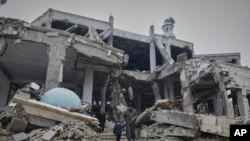ເພງດົນຕີ ປັອບ ຂອງ ເກົາຫຼີໃຕ້ ຫຼື K-pop, ໄດ້ກາຍເປັນປາກົດການຂອງໂລກໄປແລ້ວ. ແຕ່ປະ ເທດດັ່ງກ່າວ ຕອນນີ້ ຍັງຢາກຈະສົ່ງອອກຍຸດທະວິທີຂອງກຳລັງຕຳຫຼວດ ເຂົາເຈົ້າເຊັ່ນກັນ. ນັກຂ່າວວີໂອເອ ເຈສັນ ສທຣັອດເທີ (Jason Strother) ຢູ່ໃນນະຄອນຫຼວງ ໂຊລ ມີລາຍງານ ສຳລັບ ພວກເຮົາ ກ່ຽວກັບ K-pop, ເຊິ່ງ ພຸດທະສອນ ຈະນຳລາຍລະອຽດມາສະເໜີທ່ານໃນອັນດັບຕໍ່ໄປ.
ເມື່ອເວົ້າເຖິງການສົ່ງອອກວັດທະນະທຳທີ່ຮູ້ຈັກດີທີ່ສຸດຂອງ ເກົາຫຼີໃຕ້ ແລ້ວ, ກຸ່ມນັກຮ້ອງຊາຍຄື BTS ແລະ ຜູ້ກຳກັບທີ່ໄດ້ຊະນະລາງວັນ ອອສກ້າ ບົງ ຈູນ ໂຮ, ຜູ້ທີ່ໄດ້ສ້າງຮູບເງົາ Parasite ນັ້ນ, ແມ່ນຢູ່ໃນລະດັບສູງສຸດຂອງ ລາຍຊື່.
ແຕ່ມັນກໍຂຶ້ນກັບບັນດາເຈົ້າໜ້າທີ່ຢູ່ທີ່ນີ້ໃນນະຄອນຫຼວງ ໂຊລ, ເຊິ່ງສິ່ງທີ່ຖືກເອີ້ນວ່າ “ຄື້ນ ເກົາຫຼີ ຫຼື Korean Wave” ກໍອາດຈະລວມມີກອງກຳລັງຕຳ ຫຼວດຂອງປະເທດດ້ວຍ.
ທ່ານ ໂຢ ແທ ຊູ, ຈາກອົງການຕຳຫຼວດແຫ່ງຊາດ ເກົາຫຼີ ກ່າວວ່າ “ໂຄງການ ຄື້ນ K-pop ແມ່ນວິທີທີ່ອົງການຕຳຫຼວດຂອງ ເກົາຫຼີໃຕ້ ຈະແບ່ງບັນປະສົບການຂອງພວກເຮົາກັບປະເທດອື່ນໆ ແລະ ຊ່ວຍເຫຼືອເຂົາເຈົ້າພັດທະນາກອງກຳລັງຕຳຫຼວດຂອງເຂົາເຈົ້າ ແລະ ປັບປຸງການຮ່ວມມືລະຫວ່າງປະເທດຂອງພວກເຮົາ ເພື່ອຕໍ່ສູ້ກັບອາຊະຍາກຳສາກົນ.”
ທ່ານ ໂຢ ກ່າວວ່າ KPNA ໄດ້ຮ່ວມມືກັບກອງກຳລັງຕຳຫຼວດໃນ 110 ປະ ເທດ.
ຜ່ານໂຄງການ K-pop, ບັນດາຄູ່ຮ່ວມຈະຮຽນຮູ້ວິທີຕໍ່ສູ້ກັບອາຊະຍາກຳທາງ ໄຊເບີ ແລະ ປັບປຸງການບັງຄັບໃຊ້ກົດໝາຍທີ່ອາໄສເທັກໂນໂລຈີ.
ທ່ານ ໂຢ ເວົ້າວ່າຫຼາຍປະເທດທີ່ກຳລັງພັດທະນາແມ່ນສົນໃຈທີ່ຈະຮຽນຈາກຕຳຫຼວດຂອງ ເກົາຫຼີໃຕ້ ຍ້ອນປະຫວັດສາດຂອງປະເທດນັ້ນ.
ທ່ານ ໂຢ ກ່າວວ່າ “ເກົາຫຼີໃຕ້ ມີປະຫວັດສາດຍຸກໃໝ່ທີ່ພິເສດ. ຫຼັງຈາກສົງຄາມ ເກົາຫຼີ, ພວກເຮົາບໍ່ມີຫຍັງ ແລະ ຄົນລຸ້ນຫຼັງເຮົາໄດ້ສ້າງທຸກຢ່າງຂຶ້ນມາໃໝ່. ພວກເຮົາໄດ້ຮັບການຊ່ວຍເຫຼືອຢ່າງຫຼວງຫຼາຍຈາກບັນດາປະເທດທີ່ພັດ ທະນາແລ້ວ, ຄື ສະຫະລັດ ແລະ ບັນດາປະເທດ ຢູໂຣບ. ແລະ ຂ້າພະເຈົ້າ ຄິດວ່າປະເທດທີ່ກຳລັງພັດທະນາບາງປະເທດໃນເວລານີ້ເຫັນ ເກົາຫຼີ ເປັນປະ ເທດທີ່ຕ້ອງເອົາແບບຢ່າງ.”
ແຕ່ຕຳຫຼວດຂອງ ເກົາຫຼີໃຕ້ ກໍບໍ່ໄດ້ຖືກພິຈາລະນາເປັນຕົວຢ່າງທີ່ດີຕະຫຼອດໄປ.
ທ່ານ ໄມເກິລ ບຣີນ ກ່າວວ່າ “ຕຳຫຼວດມີຊື່ສຽງທີ່ບໍ່ດີຫຼາຍ.”
ໃນຫຼາຍທົດສະວັດທີ່ຜ່ານມາ, ຕຳຫຼວດ ເກົາຫຼີໃຕ້ ກັບພວກນັກເຄື່ອນໄຫວນັກສຶກສາໄດ້ປະທະ ກັນ ໃນການປະທ້ວງທີ່ຮຸນແຮງ.
ການຂ້ານັກສຶກສາຄົນນຶ່ງໂດຍຕຳຫຼວດ ໄດ້ກໍ່ໃຫ້ເກີດຂະການເຄື່ອນໄຫວປະຊາທິປະໄຕຂອງ ເກົາ ຫຼີໃຕ້ ໃນປີ 1987 ທີ່ໄດ້ນຳໄປສູ່ການສິ້ນສຸດຂອງອະດີດລະບອບຜະເດັດການຂອງປະເທດ.
ທ່ານ ບຣີນ ກ່າວວ່ານັບຕັ້ງແຕ່ນັ້ນມາ, ພາບພົດຂອງອົງການຕຳຫຼວດແມ່ນໄດ້ຖືກປັບປຸງໃຫ້ດີຂຶ້ນ.
ທ່ານ ໄມເກິລ ບຣີນ ກ່າວວ່າ “ມັນມີການຫຼຸດຜ່ອນລົງເທື່ອລະເລັກລະນ້ອຍ. ຂ້າພະເຈົ້າຄິດວ່າຕຳ ຫຼວດໃນຫຼາຍປີທີ່ຜ່ານມາເຂົ້າໃຈວ່າພວກນັກສຶກສານັ້ນ ແມ່ນພວກທີ່ໃຊ້ຄວາມຮຸນແຮງຍ້ອນກົນ ລະຍຸດຕຳຫຼວດຂອງເຂົາເຈົ້າເອງ.”
ທ່ານ ບຣີນ ກ່າວວ່າ ການປ່ຽນແປງທີ່ວ່ານີ້ ໄດ້ຊ່ວຍເຮັດໃຫ້ການປະທ້ວງສ່ວນໃຫຍ່ມີຄວາມສະ ຫງົບໃນປັດຈຸບັນນີ້.
ຄືກັບການປະທ້ວງແສງທຽນ ທີ່ໄດ້ນຳໄປສູ່ການຟ້ອງຮ້ອງປົດຕຳແໜ່ງອະດີດປະ ທານາທິບໍດີ ພາກ ກຶນ ເຮ ໃນປີ 2017.
ທ່ານ ກິມ ຈິນ ຮຸງ, ຈາກອົງການຕຳຫຼວດແຫ່ງຊາດ ເກົາຫຼີ ກ່າວວ່າ “ການປະທ້ວງໃນ ເກົາຫຼີໃຕ້ ໄດ້ກາຍມາມີຄວາມສະຫງົບ. ມັນມີການເຄົາລະຫວ່າງກັນ ຂອງຜູ້ປະທ້ວງກັບຕຳຫຼວດໃນປັດຈຸບັນນີ້.”
KPNA ກ່າວວ່າ K-pop ຂອງເຂົາເຈົ້າ ແມ່ນຍິນດີທີ່ຈະເຮັດວຽກກັບຄູ່ຮ່ວມໃນໂລກຂອງເຂົາເຈົ້າ ເພື່ອເຮັດໃຫ້ການປະທ້ວງຂອງເຂົາເຈົ້າມີຄວາມປອດໄພຂຶ້ນເຊັ່ນກັນ.
South Korean pop music, K-pop, has become a global phenomenon. But the country now wants to also export its police force’s tactics. Jason Strother in Seoul tells us about “K-cops.”
When it comes to South Korea’s best-known cultural exports, boybands like BTS and Oscar-winning director Bong Joon-ho, who created Parasite, are at the top of the list.
But if it’s up to authorities here in Seoul, the so-called “Korean Wave” would also include the country’s police forces.
South Korea’s National Police Agency says "K-Cops" have a lot to offer police forces across the globe.
“The K-cop Wave program is a way for South Korea’s police agency to share our experience with other countries and help them improve their police forces and improve cooperation between our nations to fight international crime.”
Yeo says the KNPA has collaborated with police forces in 110 countries.
Through the K-cop program, partners learn how to combat cybercrime and improve technology-based law enforcement.
Yeo says many developing nations are interested to learn from South Korea’s police because of the country’s history.
“South Korea has a unique modern history. After the Korean War, we had nothing, and our predecessors had to rebuild everything. We received a lot of help from developed countries, like the United States and European nations. And I think some developing countries now see Korea as a model to follow.”
But South Korea’s cops weren’t always seen as positive models.
“The police had an awful reputation.”
In past decades, South Korean police and student activists clashed in violent protests.
The police killing of a student protestor sparked South Korea’s 1987 democracy movement that led to the end of the country’s former dictatorship.
Breen says since then, the police agency’s image has improved.
“There’s a gradual scaling back. I think the police years ago realized the students were violent because of their own police tactics.”
Breen says these changes have helped make demonstrations largely peaceful today.
Like the candlelight protests that led to the impeachment of former president Park Geun-hye in 2017.
“Protests in South Korea have become peaceful. There’s a mutual respect between the demonstrators and police now.”
The KNPA says its K-Cops are happy to work with global partners to make their protests safer, too.










